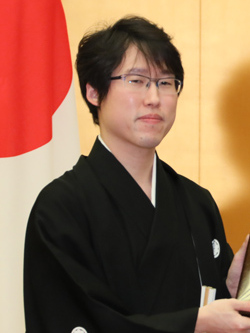This article needs to be updated.(July 2018) |
| Years in go: | 2008 2009 2010 2011 2012 2013 2014 |
| Centuries: | 20th century · 21st century · 22nd century |
| Decades: | 1980s 1990s 2000s 2010s 2020s 2030s 2040s |
| Years: | 2008 2009 2010 2011 2012 2013 2014 |
This article needs to be updated.(July 2018) |
| Years in go: | 2008 2009 2010 2011 2012 2013 2014 |
| Centuries: | 20th century · 21st century · 22nd century |
| Decades: | 1980s 1990s 2000s 2010s 2020s 2030s 2040s |
| Years: | 2008 2009 2010 2011 2012 2013 2014 |
The following are the scheduled events of the ancient game of Go for the year 2011 throughout the world. Most of the Go tournaments are held in Asia.
Lee Chang-ho is a South Korean professional Go player of 9-dan rank. He is regarded by many as the best Go player of the late 1990s and early 2000s. He was a student of Cho Hun-hyun 9-dan. He is the second youngest to become a professional Go player in South Korean history behind Cho Hun-hyun. He is the only player to have won all eight international competitions at least once.

Cho Hunhyun is a South Korean professional Go player and politician. Considered one of the greatest players of all time, Cho reached professional level in Korea in 1962. Since then, Cho has amassed 150 professional titles, more than any other player in the world. He thrice held all of the open tournaments in Korea in 1980, 1982 and 1986. Cho has also won 11 international titles, third most in the world behind Lee Chang-ho (21) and Lee Sedol (18). He reached 1,000 career wins in 1995.

Cho Chikun25th HoninboHonorary Meijin is a professional Go player and a nephew of Cho Namchul. Born in Busan, South Korea, he is affiliated to Nihon Ki-in. His total title tally of 75 titles is the most in the history of the Japanese Nihon Ki-in. Cho is the first player to hold the top three titles—Kisei, Meijin, and Honinbo—simultaneously which he did for three years in a row. Cho is the first in history to win all of the "Top 7" titles in Japan which he achieved by winning the Oza in 1994. Cho U in 2011 and Iyama Yuta in 2013 would duplicate this feat, both by winning the Kisei. He is also one of the 'Six Supers' Japanese players that were most celebrated in the late twentieth century, along with Rin Kaiho, Otake Hideo, Takemiya Masaki, Kato Masao and his classmate and arch-rival Kobayashi Koichi. He is the author of several books on Go.
Cho U is a Taiwanese professional Go player. He currently ranks 6th in the most titles won by a Japanese professional; his NEC Cup win in 2011 put him past his teacher Rin Kaiho and Norimoto Yoda. Cho is the first player in history to have held five of the top seven major titles simultaneously with Iyama Yuta being the second. Cho U, Naoki Hane, Keigo Yamashita and Shinji Takao make up the group of players in Japan called the "Four Heavenly Kings". His wife is one of Japan's best female go professionals, Izumi Kobayashi, the great Kitani's granddaughter and daughter of Kobayashi Koichi.

Chen Yaoye is a Chinese professional Go player.

Yuta Iyama Kisei, Honinbo, Meijin is a Japanese professional Go player. In April 2016, he became the first player in Japanese history to hold all seven major titles simultaneously. In January 2018, Iyama became the first professional Go player to be awarded Japan's People's Honour Award.
Keigo Yamashita is a professional Go player. Yamashita adopted the name Honinbo Dowa after winning his first Honinbo title in 2010.
Gu Li is a Chinese professional Go player.
Choi Cheol-han (Korean: 최철한) is a South Korean professional Go player. He is the fourth youngest to become a professional Go player in South Korean history behind Cho Hun-hyun, Lee Chang-ho and Cho Hye-yeon. His nickname is "The Viper".
The Nongshim Cup is a Go tournament sponsored by Nongshim, an instant noodle food company of South Korea.
The Women's Honinbo is a Japanese Go competition.
Kimio Yamada is a professional Go player. A territorial player who is adept at invading and living within opponent's spheres of influence, Yamada won his first major title, the Oza, in 1997. He has two older brothers, Shiho Yamada and Wakio Yamada.
Zhou Ruiyang is a Chinese professional Go player.
The 1st Bosai Cup was the first edition of the Bosai Cup.
The 24th Fujitsu Cup featured 32 players.
The 35th Kisei began league play on 3 June 2010 and concluded with Cho U defending his title in six games over challenger Iyama Yuta on 11 March 2011.
The 15th LG Cup began on 7 June 2010 and concluded on 23 February 2011. Piao Wenyao won the title, defeating compatriot Kong Jie in the final. 32 players from four countries competed in the final knockout tournament:
Zen, sold as Tencho no Igo in Japan, is a closed source Go playing engine developed by Yoji Ojima (尾島陽児), a Japanese Go programmer.
Shi Yue is a Chinese professional go player.